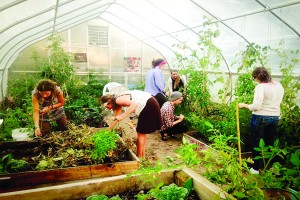A growing concern about self-sufficiency and self-reliance in the food arena has caused some students to take action in the form of a new spin on agriculture.
The Garden Club and the Students for Sustainability have been working together to bring NMU its first permaculture garden. The unique aspect of this garden is its ability to remain self-sufficient with little human interaction, said Garden Club Vice President Ana Fernandez. She said it will provide an educational opportunity.
“We wanted to bring something close to campus so people can see it hands-on here, and we also wanted somewhere we can grow food for our students and people can learn about it,” Fernandez said. “We want to make this an educational and interactive experience for everybody.”
Permaculture involves the planting of several different crops instead of having several acres of one crop. A biodiversity is created in the design so that multiple crops work with each other rather than competing for nutrients in the soil, sunlight and growing space, said Garden Club President Hannah Poisson-Smith. She described a hypothetical situation to describe the benefits of plant biodiversity.
“Say you have 10 acres of corn. All the corn stalks will be after the same nutrients in the soil and competing for sunlight and space. They’ll be susceptible to the same diseases and will attract the same pests as well,” Poisson-Smith said. “But if you have different variety, say an oak tree surrounded by hazelnut bushes and various berries and mint, the mint will scare certain rodents, and they’ll stay away from the hazelnuts.”
Permaculture is based on three core principles, said Angela Johnson, permaculture certified project adviser.
The principles include care for people, care for the Earth and fair share, as to create equal distribution of resources. Johnson said the opportunity is applicable to all.
“It’s very multidisciplinary and it doesn’t matter what you’re studying because everybody eats, right?” Johnson said. “That’s an important part of living sustainably as is being connected to the land.”
Garden Club Treasurer Karlee Remoli said another unique aspect of the project was the community support it garnered.
“The garden is a sense of community,” Remoli said. “It’s bringing members of the community together. That is really important wherever you are. You see a good sense of community in Marquette but you’re trying to expand on that, trying to expand on the economic growth of the area.”
A variety of items will be planted, including native plants and flowers, annuals, like carrots and potatoes, various herbs, guilds, a three-sisters demonstration with corn, beans and squash as well as the four sacred medicines: sweetgrass, tobacco, sage and cedar.
Fernandez said the project is diverse enough to include several volunteers from various majors. Art and design students can create and display their art in the garden, construction management majors can help build a shed and business majors can draw up a business plan revolving around the garden, Fernandez said.
“When I started school here, I wanted to volunteer and get involved in more sustainable practices, since that’s what we’re studying essentially,” Fernandez said. “There were things available, but it wasn’t really known to the student body. Myself and others have been trying to reverse that, hoping people will get involved.”
The idea for a permaculture garden sprouted from Johnson’s summer permaculture class attended by Students for Sustainability President Andrew Adamski.
“It gave me a lot of firsthand experience in developing and implementing permaculture ideas and designs,” Adamski said. “She [Johnson] was really inspiring, just to see someone actively doing it since it’s not a huge thing yet.”
Adamski worked with Remoli to write a grant proposal for $3,000. The proposal was approved in October of 2014. Originally, the project coordinators sought the plot where old Jamrich stood.
Adamski said administration found it too “grandiose” and proposed starting smaller. A plot on the corner of Longyear and Summit behind Spooner Hall was approved as the future home in February 2015. This location is easily accessible to both the community and students and is walking distance from main campus, Fernandez said.
The group said they hope the garden continually has volunteers dedicated to the idea and is utilized by the entire Marquette community.
“We want people to feel involved with whatever they can put in,” Fernandez said. “It’s really just open for discussion, questions and suggestions.”
Poisson-Smith said she already had an individual approach her in regard to a history professor who was currently teaching his class about the history of the apple tree in Marquette and can’t wait to take students down to see the garden.
The garden will follow the timeline of the summer permaculture class, which starts May 18. Poisson-Smith said the class meets once a week from 9 a.m. to 2 p.m. and that time will be dedicated to the work necessary to make the garden successful.






























